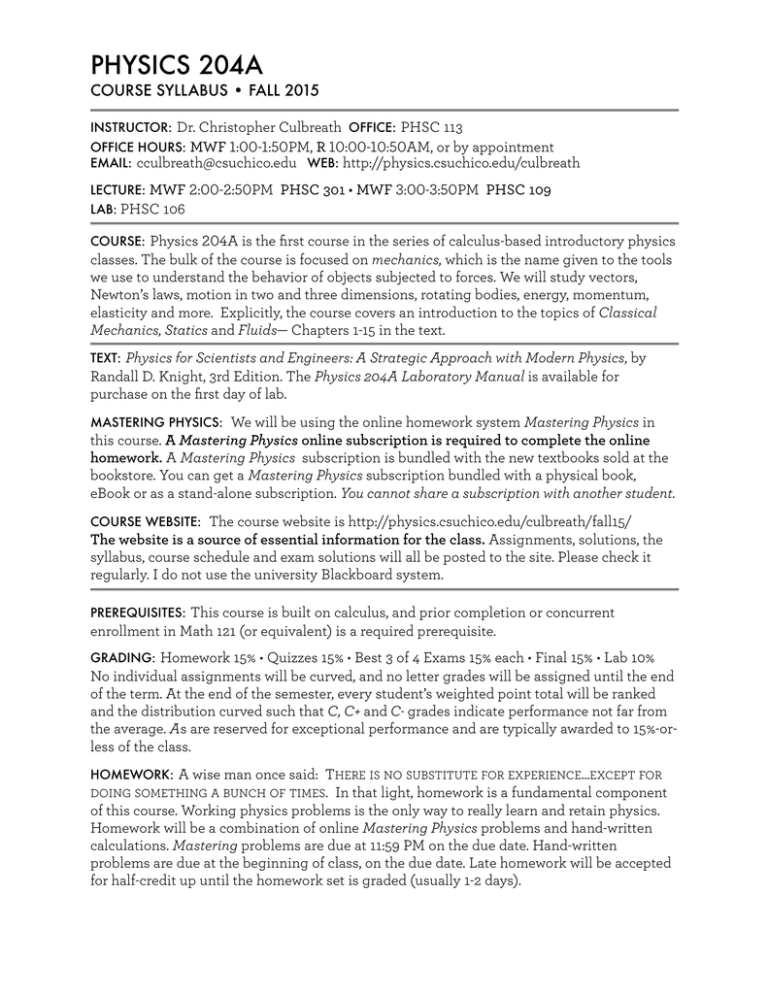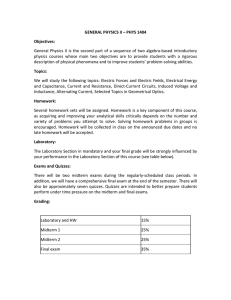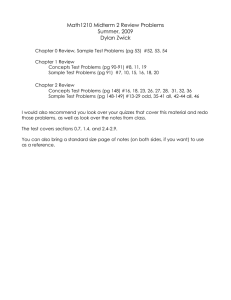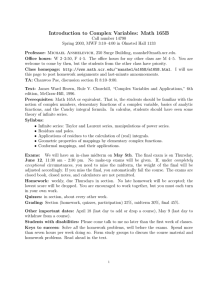physics 204a - CSU Chico Department of Physics
advertisement

PHYSICS 204A COURSE SYLLABUS • FALL 2015 INSTRUCTOR: Dr. Christopher Culbreath OFFICE: PHSC 113 OFFICE HOURS: MWF 1:00-1:50PM, R 10:00-10:50AM, or by appointment EMAIL: cculbreath@csuchico.edu WEB: http://physics.csuchico.edu/culbreath LECTURE: MWF 2:00-2:50PM PHSC 301 • MWF 3:00-3:50PM PHSC 109 LAB: PHSC 106 COURSE: Physics 204A is the first course in the series of calculus-based introductory physics classes. The bulk of the course is focused on mechanics, which is the name given to the tools we use to understand the behavior of objects subjected to forces. We will study vectors, Newton’s laws, motion in two and three dimensions, rotating bodies, energy, momentum, elasticity and more. Explicitly, the course covers an introduction to the topics of Classical Mechanics, Statics and Fluids— Chapters 1-15 in the text. TEXT: Physics for Scientists and Engineers: A Strategic Approach with Modern Physics, by Randall D. Knight, 3rd Edition. The Physics 204A Laboratory Manual is available for purchase on the first day of lab. MASTERING PHYSICS: We will be using the online homework system Mastering Physics in this course. A Mastering Physics online subscription is required to complete the online homework. A Mastering Physics subscription is bundled with the new textbooks sold at the bookstore. You can get a Mastering Physics subscription bundled with a physical book, eBook or as a stand-alone subscription. You cannot share a subscription with another student. The course website is http://physics.csuchico.edu/culbreath/fall15/ The website is a source of essential information for the class. Assignments, solutions, the syllabus, course schedule and exam solutions will all be posted to the site. Please check it regularly. I do not use the university Blackboard system. COURSE WEBSITE: PREREQUISITES: This course is built on calculus, and prior completion or concurrent enrollment in Math 121 (or equivalent) is a required prerequisite. GRADING: Homework 15% • Quizzes 15% • Best 3 of 4 Exams 15% each • Final 15% • Lab 10% No individual assignments will be curved, and no letter grades will be assigned until the end of the term. At the end of the semester, every student’s weighted point total will be ranked and the distribution curved such that C, C+ and C- grades indicate performance not far from the average. As are reserved for exceptional performance and are typically awarded to 15%-orless of the class. HOMEWORK: A wise man once said: THERE IS NO SUBSTITUTE FOR EXPERIENCE...EXCEPT FOR DOING SOMETHING A BUNCH OF TIMES. In that light, homework is a fundamental component of this course. Working physics problems is the only way to really learn and retain physics. Homework will be a combination of online Mastering Physics problems and hand-written calculations. Mastering problems are due at 11:59 PM on the due date. Hand-written problems are due at the beginning of class, on the due date. Late homework will be accepted for half-credit up until the homework set is graded (usually 1-2 days). HOMEWORK PRESENTATION: Homework problems should be worked on blank, unruled, paper or quad-ruled, engineering-type graph paper. Do not use regular lined notebook paper. Blank printer paper is everywhere; use that instead. Only use one side of the paper. Clearly indicate the problem number on each page. Bind all pages of the homework set with a single staple in the upper-left corner. Number the pages in the upper right corner. Whenever possible, the solution should include a figure or sketch that illustrates the key parameters of the problem. Answers must be reported using the correct number of significant figures. Try to make your calculation as clear and tidy as possible; little effort will be made to decipher sloppy work. Work problems symbolically until the last step, at which point you can plug-in actual numbers and recover a numeric answer. Problems are graded on a 5-point scale. Beyond the clarity and correctness of the solution, points will be deducted for omitting a sketch or reporting answers with the wrong number of significant figures. LAB: The three-hour lab meets weekly. Prepare for lab each week by reading the lab manual before coming to class. The lab schedule is attached to this syllabus. Lab Policies: 1. One lab can be missed without penalty. 2. If you more than one lab, you must make the both up. Therefore if you miss more than one lab session, you will not receive a passing grade in the course. 3. The first 30 minutes of lab will be used for homework question or a quiz. 4. Quizzes will be given at the beginning of the lab period. No quiz makeups for absence or tardiness. 5. If you must miss lab, you can make it up the same week in another section, but you must make arrangements with the appropriate lab instructor to participate in an alternate lab session. Laboratory report and grading requirements are at the discretion of the lab instructor. For students enrolled in my lab sections, keep these things in mind: One lab report will be collected for each lab group. Every student must write and sign their own conclusion for each lab, every week. You may not leave before your lab group is done: all lab conclusions must be turned in together, and you must be present to for your work to be accepted. QUIZZES: Quizzes will be scheduled at least one day in advance. There are no pop-quizzes in this course. Quizzes will be used to test mastery of homework concepts, insure reading of the book before lecture, or test understanding of lab concepts. Quizzes will be conducted in-class using a smart-phone or laptop response system. Quizzes in lab will be completed by hand. SMART-PHONE PARTICIPATION: We will use an in-class smart-phone capable website for quizzes, feedback and questions during lecture. The website can be accessed from a smart phone or laptop. If you do not have access to a smart phone for use in class, please notify the instructor. EXAMS: Four one-hour midterm exams and a comprehensive final exam will be given during the semester as tentatively scheduled on the syllabus. Since everyone has a bad day from time to time, the lowest midterm score will be dropped from the final grade calculation. Make up exams will not be given. If you miss a midterm, it is the score that will be dropped. Each exam is comprehensive and builds on material from earlier in the course. COLLABORATION: I strongly encourage you to collaborate on homework and lab exercises. But, when studying and working in a group, be sure to participate. Even though homework and lab are only one third of your overall grade, they represent the bulk of the work that goes into this course. If you want to be successful on exams, you need to make sure you understand and participate in group discussion. Collaboration is different than plagiarism. Do not copy the work of your colleagues and don’t copy the solutions that you find online for book problems. There are plenty of resources for getting help (mentioned below). Plagiarism is not allowed and will result in a failing grade for the course. CHEATING: Cheating will not be tolerated. No electronic communication, outside materials or calculators are allowed during exams. Students caught cheating will receive an F in the course and be referred to Student Judicial Affairs. HELP: Drop-in tutors (upper-division physics students) are available for tutoring— see their schedule posted in PHSC 110. Physics 204X is a 1-unit study and discussion session designed to accompany Physics 204A. You don’t need to register to attend, but if you do register, you do need to attend a minimum number of sessions to obtain credit. You are also encouraged to attend my office hours. I like to use office hours to work problems as a group, and they can be a great way to get unstuck on problems that may be stumping you. Also, remember that I am here to teach you physics! Email me, come to my office hours, ask as many questions as you need—your questions are not an interruption; answering them is what I’m here to do. I love teaching physics. COURSE SCHEDULE TENTATIVE • SUBJECT TO CHANGE - UPDATED 9/16/2015 WEEK DATE CHAPTER TOPIC LAB 1 8/24 1 Concepts of Motion Intro to Mechanics Lab 2 8/31 2 Kinematics in One Dimension Uncertainty in Measurement 3 9/7 3 Vectors and Coordinate Systems No Lab 4 9/14 4 Kinematics in 2D Free Fall 5 9/21 5 Force and Motion Projectile Motion MON 9/28 FIRST MIDTERM EXAM (CHAPTERS 1–4) 6 9/28 6 Dynamics I: Motion Along a Line TBD 7 10/5 7 Newton’s Third Law Newton’s 2nd Law 8 10/12 8 Dynamics II: Motion in Plane Friction 9 10/19 9 Impulse and Momentum Circular Motion 10 10/26 10 Energy Impulse and Momentum MON 10/26 SECOND MIDTERM EXAM (CHAPTERS 5–8) 11 11/2 11 Work Momentum & Energy Conservation 12 11/9 12 Rotation of a Rigid Body Work and Energy MON 11/16 THIRD MIDTERM EXAM (CHAPTERS 9–11) 13 11/16 12 Rotation of a Rigid Body Moment of Inertia 11/23–11/27 THANKSGIVING BREAK 15 11/30 13 Newton's Theory of Gravity Ballistic Pendulum 16 12/7 15 Fluids and Elasticity Static Equilibrium FRI 12/11 FORTH MIDTERM EXAM (CHAPTERS 12, 13, 15) FINAL EXAM: TBD FINAL EXAM: TBD



